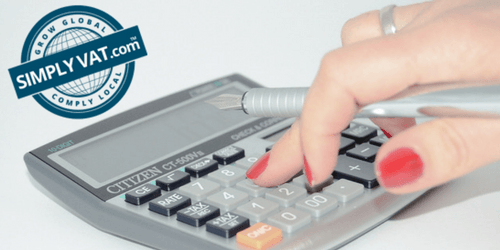

Quick Links
Quick Links

Are you an online retailer selling goods in the EU? If so, you are probably already aware of what a lucrative decision this can be. ‘Going Global’ by tapping into overseas markets can greatly increase your profits. Excitingly, the rise of online marketplaces means that you no longer need to be a global giant to take advantage of cross-border sales. You can take advantage of an international customer base from the very start of your e-commerce venture.
As an online retailer, what do I need to know about VAT?
Whether you are a small online retailer selling artisan crafts, or an established e-commerce giant, you need to be aware of what your VAT obligations are when selling internationally. VAT laws can be complicated territory, leaving many smaller e-tailers (who cannot afford the luxury of an onsite tax department) feeling lost and overwhelmed.
It is our belief that understanding your VAT obligations should not hold you back from your plans for global success. Our Q&A and top tips about VAT compliance below will give you the insight you need to give your business the best chance of success.
Back to Basics: What is VAT?
Value Added Tax (VAT) is the preferred transactional tax model in the EU and is equivalent of the USA sales tax. It differs from sales tax as it is applied every time value is added– from the raw material supplier, to the manufacturer to the wholesaler and retailer and finally to the end consumer. Governments get revenue every step of the supply chain. It is not supposed to be a burden on businesses, who, once VAT registered, can offset any VAT collected on sales against any VAT incurred on expenditure – including import VAT.
How do I know which VAT laws affect my business?
The way you choose to sell and distribute your goods will determine what your VAT obligations are.
Non-EU Companies Selling Into the EU
If you are selling your goods into the EU, import VAT will be applied at the goods’ first point of entry. If you are not already VAT registered in this country you need to decide who the ‘Importer of Record’ will be. The ‘Importer of Record’ is the party who will be responsible for paying the import VAT charged at the point of entry.
Key Term: Importer of Record
It is vital to understand who the Importer of Record will be, as this can greatly affect the experience of customers who are buying your products. Why? Because it is usually the consumer who will be asked to pay the import VAT, via the parcel carrier, before the goods will be delivered. This surprise extra charge can leave your customers feeling cheated, and may even negate their reason for choosing to buy with you. It can also lead to dreaded bad reviews and lack of return custom.
To avoid this, you may want to consider registering for VAT in the country where your goods enter the EU. You will be issued with an EORI number and become the importer of record for your goods.
Key Term: EORI Number
This stands for Economic Operator Registration Identification number and is issued by the EU customs authorities. You will be issued with an EORI number when you VAT register. Once you have attained an EORI number, you, rather than the customer, will be charged import VAT. This will save them from any unexpected surprises.
Import VAT paid by you, can be reclaimed on your VAT return.
I’m VAT registered. What next?
At this point is it essential that you are including EU VAT costs in the prices shown to your customers at the point of purchase. VAT should be charged at the rate of the country in which you are registered in (for example, 20% in the UK). You will need to pay the VAT charged to your customers to the local tax authority on your VAT return.
EU VAT Distance Selling Rules – What are they and why do they matter?
Once EU VAT registered, any sales online to private consumers in the EU are governed by the EU VAT distance selling rules. These rules state that local VAT should be charged on any sales until set EU government thresholds are exceeded. Once the threshold is exceeded in any one calendar year, EU VAT registration is required in that country:
The current thresholds are:
- Euros 35,000 (or local currency equivalent) in most EU countries
- Euros 100,000 (or equivalent) in Germany, Netherlands and Luxembourg
- GBP 70,000 in the UK
The Distance Selling rules do give you a chance to test the European markets without the heavy cost of compliance.
It is worth noting that these rules apply even if you are selling through the marketplaces such as Amazon and eBay.
Holding stock in the EU: From Warehouses to Fulfilment Centres
Whether you are using Amazon’s fulfillment services, or choosing to store your goods in an independent warehouse, holding stock in any EU country triggers a legal obligation to VAT register in that country. This rule applies whether you are holding 1 or 100 products. Many unaware retailers have been caught out by this, so make sure you know where your stock is being held.
Fiscal Representation – Will I need it?
If you are a company based outside of the EU, some countries such as France, Italy and Poland may require you to have a Fiscal Representative who is jointly and severely liable for the VAT owed. There are additional fees associated with this, such as bank guarantees – representatives don’t want to be left paying the bill.
An alternative route would be to set up a company in the EU. However, this comes with other obligations such as annual reporting. Determining which option is most suitable for your company depends on your individual business.
What are EC Sales Lists?
When stock is sold, or transferred between EU countries, there is additional reporting obligations to file an EC Sales List. For example, if stock is moved from the UK warehouse to a German warehouse, this will need to be reported on an EC Sales List as well as the UK VAT return. This is particularly relevant when using Amazon’s Pan-EU service as stock is moved, by Amazon, on your behalf between 7 different EU countries.
It is also worth noting that using Amazon’s Pan-EU service triggers VAT registrations in those 7 countries – Germany, France, Italy, Spain, UK, Czech Republic and Poland.
Intrastat Declarations – When do I need these?
Intrastat Declarations are mandatory statistical returns which allow the tax authorities to monitor the movement of goods within the EU. Each country has its own reporting thresholds, which differ from the registration threshold. You will need to monitor sales, for example, from the UK to any EU countries, once these ‘dispatches’ reach £250,000, intrastat declarations will need to be filed.
What will happen if I don’t comply?
Sticking your head in the sand and ignoring your EU VAT obligations cannot be a long-term strategy. The tax authorities are becoming more and more proactive in hunting down non-compliant online sellers as the tax authorities get to keep the VAT revenue collected from online sales.
Amazon marketplaces across the EU have come under increasing pressure to ensure that sellers using their services are being VAT compliant. This has included the German tax authority demanding seller data from Amazon.de in Germany. Another example of this is in the UK, where the UK new legislation has been issued to make the marketplaces and fulfillment centers responsible for their client’s compliance. HMRC now has the power to make Amazon close your store down within 30 days if you are not VAT compliant.
Factoring EU VAT compliance into your business – 10 Top Tips
When selling overseas it is vital that you:
- Plan ahead. Make sure you have systems in place to monitor your sales.
- Don’t get caught out by exceeding distance selling thresholds. Remember: Selling just small amounts of medium to high value goods could put you over the threshold.
- Factor the cost of compliance into your business alongside other costs such as marketing.
- Keep up-to-date with the VAT registration thresholds and where relevant, monitor currency fluctuations.
- Know which EU VAT rates apply to your goods or services. If you are in the EU, you may be familiar with the classification system in your own country, but it can vary elsewhere within Europe. Children’s clothing is a good example – it is zero-rated in the UK and Ireland, but attracts VAT everywhere else in the EU.
- Once registered in another country, do not charge VAT for your own country as well as the buyer’s country. VAT should only be charged once.
- Make sure you get registered if you exceed distance selling thresholds or if you are holding stock in a country. It can take approximately 6 weeks to obtain an EU VAT registration, depending on the country that you are registering in.
- Once registered, make sure your invoices comply with local regulations.
- Don’t let EU VAT compliance hold you back from your E-Commerce expansion plans.
- Get expert advice and guidance to help give your business the best chance of success.

Ella is a content writer and project assistant at SimplyVAT. She has previously worked in digital marketing for e-commerce businesses, but has recently turned her interest to the world of VAT, helping businesses expand internationally. She holds a degree in History, Literature and Culture and enjoys travelling and a great cup of coffee.

